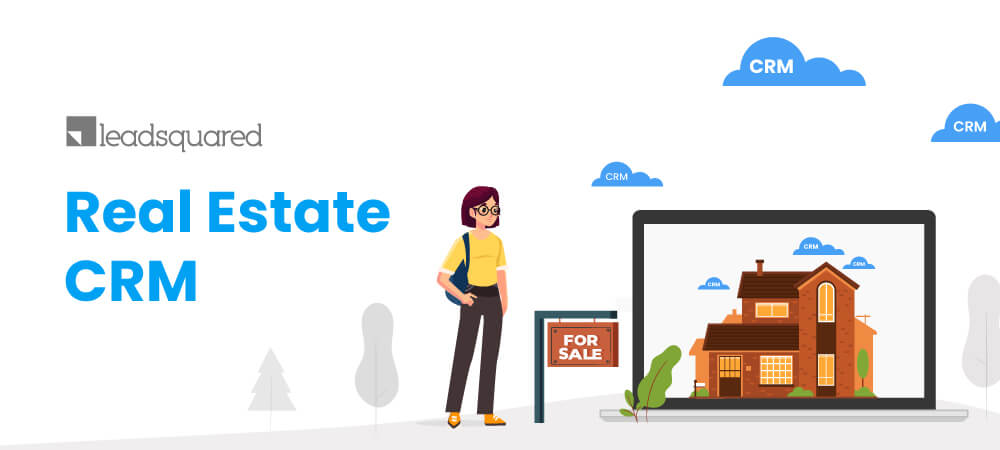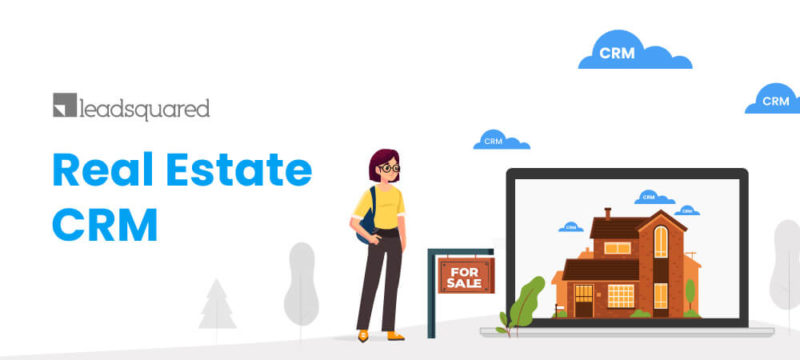
The real estate industry continues to see rapid growth, especially in India. The year 2020 looks like an exciting – and an even busier – year for real estate firms, marketing teams, realtors, brokers, and everyone else involved, as the real estate market in India is expected to amass a whopping $180 billion at the end of 2020. (Source)
On a grand scale, this points to fierce competition between players in the industry. It also means that marketing teams will be on the lookout for the best tools that will enable them to sell more properties and do it faster. One of such is real estate CRM software.
I’ll explain why you need to quickly adopt a real estate CRM software, as well as the essential things to look for when getting one. But first, let us understand,
What is Real Estate CRM Software?
For every real estate marketing team, acquiring new customers is the number one goal. A uniquely tailored real estate CRM software makes this easier than ever. It helps you visualize a lead as a real person – their likes, dislikes, motivations – by following their activities, understanding their interests, and identifying their intent.
These days, the difference between a successful agent and an underperforming one is the presence of a holistic real estate CRM software.
From lead generation to tracking, follow-ups, marketing campaign monitoring, the CRM does everything it’s supposed to – help you turn potential customers into paying ones.
7 Must-Have Features of Real Estate CRM Software
As you go on the lookout for the perfect CRM for your real estate team, here are some core features to put in mind.

1. Automated Agent Notifications
When a new lead enters your system, the ideal next step will be to assign them to the relevant team member. Your real estate CRM software should ideally send them notifications to remind them of their tasks, lest they forget. The notifications can come via text messages or email. Remember, the quicker you react to leads, the higher your chances of lead conversion.
2. Lead Segmentation
Categorize your leads based on certain factors like their preferences, location, demographics, financial status, etc. It helps you to develop the best strategy for engaging them. For instance, if a prospect is looking for a house in Delhi, it would be better to assign them to someone who knows the city well enough to suggest places to live and what they can enjoy or avoid by staying in some regions of the city. Lead segmentation is also vital for maintaining relevant messaging across all your communication channels.
3. Drag-and-Drop Landing Pages
This is especially important if your company is always running multiple marketing campaigns across different channels. It can be time-consuming to create landing pages for each project or property. Therefore, a must-have is an in-built landing page feature that lets you create responsive landing pages for your campaigns quickly.
4. Lead Activity Tracking
Capture all your interactions with your leads from when they first arrived on your landing page till closure and beyond. It includes phone calls, site visits, email communication, and so on. Understanding your customers helps you to improve their experience and maintain a healthy relationship with them.
5. Lead Scoring
This helps your sales team identify the best opportunities for closure. Using in-built criteria in the real estate CRM software, define your leads as high quality, medium quality, and low quality. This way, team members know what to attend to first at any point in time.
6. Mobile CRM
The right CRM gives you ample flexibility. This often comes in the form of mobile apps. Your real estate CRM should enable your sales team to respond to inquiries on the go. Imagine if they have to wait till they get to the office before following up with customers?
There is a chance that you may lose the opportunity.
7. Analytics Tool
The best decisions are obtained from data. The ideal CRM software for real estate agents is one that enables you to analyze your leads, campaigns, agents and everything in between. This way, you can develop better strategies and make corrections in the right places.
[Also Read: PropTech – A Digital Revolution in Real Estate]
Why You Should Adopt Real Estate CRM Software?
Remove automation from the customer acquisition process, and you realize that it gets difficult. It is an uphill battle that many real estate marketing teams face. How many times have you forgotten to update your excel sheet with the information of a lead you just got? Or that other time you misplaced a prospect’s card you got at a networking event? Not to mention the amount of time it takes you to fill lead information manually. Unfortunately, every lead lost equals losing a potential source of income.
Here are some reasons why that shouldn’t be the same game you’re playing in 2020 if you want to get ahead of the competition.
1. Follow up with Leads Faster
You can jeopardize your lead generation efforts if follow-up isn’t done correctly and quickly. In the real estate industry, faster is better. 68% of people looking to buy homes go with the first agent they talk to. The right real estate CRM software automatically assigns leads to members of your team as soon as they arrive from your marketing campaigns. You simply won’t miss a single property inquiry.
2. Stop Lead Leakage
One major disadvantage of using traditional lead acquisition methods is that leads can get lost in the thick of things. Especially when you have different marketing campaigns running on various channels like Google, YouTube, Facebook, Twitter, LinkedIn, and more.
The CRM software gives you a complete view of everything that is going on, where the leads are coming from, the agents currently following up on specific leads, and the status of each lead.
3. Send Leads to the Right Salesperson
Let’s assume you have a team of real estate brokers with different sales expertise in, say, residential properties, commercial properties, luxury homes. The ideal real estate CRM software enables you to send incoming leads to them based on the need of the customer (the type of property, location, budgets and more). This way, not only do you save time, but also ensure that your team members work on just the right tasks.
4. Increase Productivity
It’s not just how far, but how well you and your team have been able to glean from your leads. Unlike traditional mechanisms like Excel, real estate CRM software helps you to perform at your best by avoiding redundant tasks. With lead scoring in real estate CRM software, you can prioritize your potential leads and reach them first. It allows you to focus more on potential buyers and increase your team’s productivity.
Sell more properties with LeadSquared’s Real Estate CRM Software
The highest-earning real estate agents spent 22% more on their real estate CRM software than lower-earning agents. It is the goal of every real estate marketing team – to sell more properties. With LeadSquared’s CRM software for real estate teams, you can also convert more leads than ever before.









